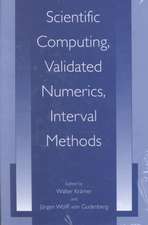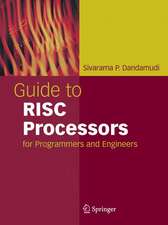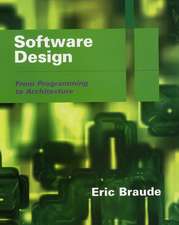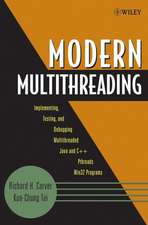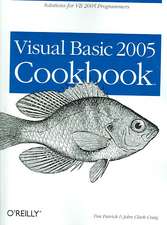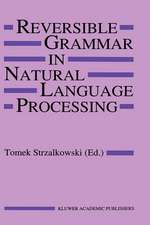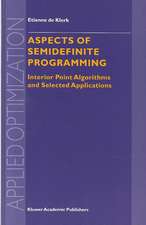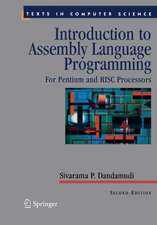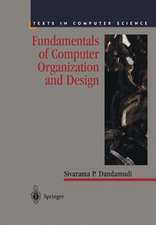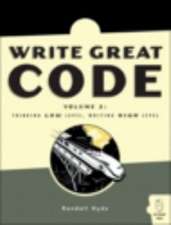Guide to Assembly Language Programming in Linux
Autor Sivarama P. Dandamudien Limba Engleză Paperback – 15 iul 2005
Provides comprehensive coverage of the Pentium assembly language
Preț: 986.55 lei
Preț vechi: 1233.18 lei
-20% Nou
Puncte Express: 1480
Preț estimativ în valută:
188.84€ • 205.19$ • 158.72£
188.84€ • 205.19$ • 158.72£
Carte tipărită la comandă
Livrare economică 21 aprilie-05 mai
Preluare comenzi: 021 569.72.76
Specificații
ISBN-13: 9780387258973
ISBN-10: 0387258973
Pagini: 545
Ilustrații: XVI, 545 p.
Dimensiuni: 170 x 244 x 25 mm
Greutate: 1.97 kg
Ediția:2005
Editura: Springer Us
Colecția Springer
Locul publicării:New York, NY, United States
ISBN-10: 0387258973
Pagini: 545
Ilustrații: XVI, 545 p.
Dimensiuni: 170 x 244 x 25 mm
Greutate: 1.97 kg
Ediția:2005
Editura: Springer Us
Colecția Springer
Locul publicării:New York, NY, United States
Public țintă
Professional/practitionerDescriere
Processor designs can be broadly divided into CISC (Complex Instruction Set Computers) and RISC (Reduced Instruction Set Computers). The dominant processor in the PC market, Pentium, belongs to the CISC category, and Linux is fast becoming the number one threat to Microsoft’s Windows in the server market. This unique guidebook provides comprehensive coverage of the key elements of Assembly language programming, specifically targeting professionals and students who would like to learn Assembly and intend or expect to move to the Linux operating system.
The book instructs users on how to install Linux on existing Windows machines. Readers are introduced to Linux and its commands, and will gain insights into the NASM assembler (installation and usage).
The book instructs users on how to install Linux on existing Windows machines. Readers are introduced to Linux and its commands, and will gain insights into the NASM assembler (installation and usage).
Cuprins
Overview.- Assembly Language.- Computer Organization.- Digital Logic Circuits.- Memory Organization.- The IA-32 Architecture.- Linux.- Installing Linux.- Using Linux.- NASM.- Installing and Using NASM.- Debugging Assembly Language Programs.- Assembly Language.- A First Look at Assembly Language.- More on Assembly Language.- Writing Procedures.- More on Procedures.- Addressing Modes.- Arithmetic Instructions.- Conditional Execution.- Logical and Bit Operations.- Advanced Assembly Language.- String Processing.- ASCII and BCD Arithmetic.- Recursion.- Protected-Mode Interrupt Processing.- High-Level Language Interface.- Floating-Point Operations.
Notă biografică
Sivarama P. Dandamudi is a professor of computer science at Carleton University in Ottawa, Ontario, Canada, as well as associate editor responsible for computer architecture at the International Journal of Computers and Their Applications. He has more than two decades of experience teaching about computer systems and organization.
Textul de pe ultima copertă
This unique guide provides comprehensive coverage of the key elements of Assembly language programming with in-depth coverage of the Linux operating system, which is the fastest-growing operating system with an estimated 18 million Linux users worldwide. The book specifically targets professionals who would like to learn Assembly and intend or expect to move to the Linux operating system.
This highly useful guidebook comes complete with all the necessary software (Linux, NASM, debugger), making it an extremely valuable resource tool for all those who want to learn Assembly programming and Linux. Readers need only have a basic knowledge of any structured, high-level language such as C to obtain the full benefits of this guidebook.
Sivarama P. Dandamudi is a professor of computer science at Carleton University in Ottawa, Ontario, Canada, as well as associate editor responsible for computer architecture at the International Journal of Computers and Their Applications. He has more than two decades of experience teaching about computer systems and organization.
Features and Benefits:
• Free NASM assembler provides hands-on assembly language programming experience
• Three chapters on computer organization provide the necessary background to program in assembly language
• Presentation of material is suitable for self-study, with extensive programming examples and figures
• All examples are complete in that they can be assembled and run, giving a better feeling as to how these programs work
Key Topics:
• Computer organization, including digital logic circuits, memory organization, IA-32 architecture
• Installing and using Linux and NASM
• Debugging assembly language programs
• Overview of assembly language instructions
• Writing procedures, addressing modes, conditional execution, logical and bit operations
• Advanced assembly language, including string processing, ASCII and BCD arithmetic, recursion, protected-mode interrupt processing, high-level language interface, floating-point operations.
This highly useful guidebook comes complete with all the necessary software (Linux, NASM, debugger), making it an extremely valuable resource tool for all those who want to learn Assembly programming and Linux. Readers need only have a basic knowledge of any structured, high-level language such as C to obtain the full benefits of this guidebook.
Sivarama P. Dandamudi is a professor of computer science at Carleton University in Ottawa, Ontario, Canada, as well as associate editor responsible for computer architecture at the International Journal of Computers and Their Applications. He has more than two decades of experience teaching about computer systems and organization.
Features and Benefits:
• Free NASM assembler provides hands-on assembly language programming experience
• Three chapters on computer organization provide the necessary background to program in assembly language
• Presentation of material is suitable for self-study, with extensive programming examples and figures
• All examples are complete in that they can be assembled and run, giving a better feeling as to how these programs work
Key Topics:
• Computer organization, including digital logic circuits, memory organization, IA-32 architecture
• Installing and using Linux and NASM
• Debugging assembly language programs
• Overview of assembly language instructions
• Writing procedures, addressing modes, conditional execution, logical and bit operations
• Advanced assembly language, including string processing, ASCII and BCD arithmetic, recursion, protected-mode interrupt processing, high-level language interface, floating-point operations.
Caracteristici
Provides comprehensive coverage of Pentium Assembly language programming
Introduces Linux concepts to programmers who are familiar with other operating systems such as Windows XP
Comes complete with all the necessary software (Linux, NASM, debugger), making it a highly useful resource tool for those who want to learn Assembly programming and Linux
Introduces Linux concepts to programmers who are familiar with other operating systems such as Windows XP
Comes complete with all the necessary software (Linux, NASM, debugger), making it a highly useful resource tool for those who want to learn Assembly programming and Linux

